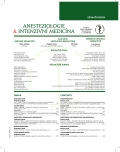-
Medical journals
- Career
Aprotinin in cardiac surgery – re-evaluation of the risks?
Authors: T. Vaněk; J. Hlavička; P. Budera
Authors‘ workplace: Kardiochirurgická klinika 3. LF UK, Praha
Published in: Anest. intenziv. Med., 27, 2016, č. 5, s. 284-288
Category: Anaesthesiology - Special Article
Overview
The article describes the history of introducing aprotinin into cardio-surgical clinical practice and deals with the circumstances based on the results of the BART study leading to its withdrawal from the global pharmaceutical market and with its recent re-authorization in some countries.
KEYWORDS:
cardiac surgery – fibrinolysis – fibrinolytic inhibitors – aprotinin
Sources
1. Peters, D. C., Noble, S. Aprotinin: an update of its pharmacology and therapeutic use in open heart surgery and coronary bypass surgery. Drugs, 1999, 57, p. 233–260.
2. Sodha, N. R., Boodhwani, M., Bianchi, C. et al. Aprotinin in cardiac surgery. Expert Rev. Cardiovasc. Ther., 2006, 4, p. 151–160.
3. Bojanov, G., Belani, K. G. Aprotinin – an update for the peri-operative physician. Ann. Card. Anaesth., 2005, 8, p. 75–80.
4. Nugent, F. W., Warren, K. W., Jonasson, H., Garciadeparedes, G. Early experience with trasylol in the treat-ment of acute pancreatitis. South. Med. J., 1964, 57, p. 1317–1321.
5. Vaněk, T. Méně invazivní kardiochirurgické přístupy pro léčbu ischemické choroby srdeční – editorial. Vnitř. Lék., 2012, 58, p. 715–716.
6. Wagner, R. Kardioanestezie a perioperační péče v kardiochirurgii. Praha: Grada Publishing, 2009, p. 163.
7. Royston, D., Taylor, K. M., Bidstrup, B. P., Sapsford, R. N. Effect of aprotinin on need for blood transfusion after repeat open-heart surgery. Lancet, 1987, 330, p. 1289–1291.
8. Vaněk, T., Špegár, J., Šnircová, J. Antifibrinolytika v kardiochirurgii – pohled z konce prvního desetiletí nového milenia. Cor. Vasa, 2010, 52 (Suppl 1), p. 48–51.
9. Levi, M., Cromheecke, M. E., de Jonge et al. Pharmacological strategies to decrease excessive blood loss in cardiac surgery: a meta-anylysis of clinically relevant endpoints. Lancet, 1999, 354, p. 1940–1947.
10. Carless, P. A., Moxey, A. J., Stokes, B. J. et al. Are antifibrinolytic drugs equivalent in reducing blood loss and transfusion in cardiac surgery? A meta-analysis of randomized head-to-head trials. BMC Cardiovasc. Disord., 2005, 5, p. 19.
11. Alderman, E. L., Levy, J. H., Rich, J. B. et al. Analyses pf coronary graft patency after aprotinin use: results from the International Multicenter Aprotinin Graft Patency Experience (IMAGE) trial. J. Thorac. Cardiovasc. Surg., 1988, 116, p. 716–730.
12. Poston, R. S., White, C., Gu, J. et al. Aprotinin shows both hemostatic and antitrombotic effects during off-pump coronary artery bypass grafting. Ann. Thorac. Surg., 2006, 81, p. 104–111.
13. Vaněk, T., Jareš, M., Straka, Z. Aprotinin reduces troponin I levels in OPCAB. Ann. Thorac. Surg., 2006, 82, p. 1950–1951.
14. Henry, D. A., Carless, P., Moxey, A. et al. Antifibrinolytic use for minimizing perioperative allogenic blood transfusion. Cochrane Database Syst. Rev., 2007, CD001886.
15. Karkouti, K., Beattie, W. S., Dattilo, K. M. et al. A propensity score case-control comparison of aprotinin and tranexamic acid i high-transfusion-risk cardiac surgery. Transfusion, 2006, 46, p. 327–338.
16. Mangano, D. T., Tudor, I. C., Dietzel, C. The risk associated with aprotinin in cardiac surgery. N. Engl. J. Med., 2006, 354, p. 353–365.
17. Fergusson, D. A., Hébert, P. C., Mazer, D. et al. A comparison of aprotinin and lysine analogues in high-risk cardiac surgery. N. Engl. J. Med., 2008, 358, p. 2319–2331.
18. European Medicines Agency – Assesment report. Antifibrinolytics containing aprotinin, aminocaproic acid and tranexamic acid. EMA/590581/2013, Procedure number: EMEA/H/A-1267.
19. Hébert, P. C., Fergusson, D. A., Hutton, B et al. Regulatory decisions pertaining to aprotinin may be putting patients at risk. CMAJ, 2014, 186, p. 1379–1386.
20. Hutton, B., Lawrence, J., Fergusson, D., Mazer, C. D., Shapiro, S., Tinmouth, A. Risks of harms using antifibrinolytics in cardiac surgery: systematic review and network meta-analysis of randomised and observational studies. BMJ, 2012, 345, e5798 doi: 10.1136/bmj.e5798.
21. Meybohm, P., Herrmann, E., Nierhoff, J., Zacharowsky, K. Aprotinin may increase mortality in low and intermediate risk but not in high risk cardiac surgical patients compared to tranexamic acid and ε-aminocaproic acid – A meta-analysis of randomised and observational trials of over 30.000 patients. PLoS One, 2013, 8, e58009 doi: 10.1371/journal.pone.0058009.
22. Walkden, G. J., Verheyden, V., Goudie, R., Murphy, G. J. Increased perioperative mortality following aprotinin withdrawal: a real-world analysis of blood management strategies in adult cardiac surgery. Intensive Care Med., 2013, 39, p. 1808–1817.
Labels
Anaesthesiology, Resuscitation and Inten Intensive Care Medicine
Article was published inAnaesthesiology and Intensive Care Medicine

2016 Issue 5-
All articles in this issue
- The 2016 definition of sepsis (Sepsis-3)
- Echocardiography in the acute coronary syndrome
- CPR-related injuries in out-of-hospital cardiac arrest patients
- Body temperature in the anaesthetised child
- Hypotension following induction to general anaesthesia: prevalence, significance, risk factors and preventive management options
- Aprotinin in cardiac surgery – re-evaluation of the risks?
- Selected aspects of anaesthesia for non-obstetric surgical procedures in the pregnant patient
- Anaesthesiology and Intensive Care Medicine
- Journal archive
- Current issue
- Online only
- About the journal
Most read in this issue- Hypotension following induction to general anaesthesia: prevalence, significance, risk factors and preventive management options
- The 2016 definition of sepsis (Sepsis-3)
- Selected aspects of anaesthesia for non-obstetric surgical procedures in the pregnant patient
- Body temperature in the anaesthetised child
Login#ADS_BOTTOM_SCRIPTS#Forgotten passwordEnter the email address that you registered with. We will send you instructions on how to set a new password.
- Career

